Introduction
Rufus Being Abusive Quotes is a powerful theme in Kindred by Octavia Butler. The story portrays the complex and troubling relationship between Dana and Rufus.
His behavior towards Dana and other characters is disturbing and difficult to ignore. The Rufus Weylin abuse analysis provides a deeper understanding of his actions.
Throughout the book, we see his gradual shift from a child to an abusive man. His treatment of Dana is marked by manipulation, control, and violence. These actions shed light on the broader themes of power and control in Kindred.
As the story unfolds, the Rufus and Alice relationship dynamics also play a crucial role in understanding his abusive tendencies. The Kindred violence quotes illustrate the horrors of slavery and its impact on human relationships.
Rufus’s abuse is not only physical but emotional as well, highlighting the themes of abuse and enslavement in literature. The power dynamics in the novel reflect how abuse and enslavement are intertwined in the historical context.
Through Kindred themes of abuse and survival, Butler creates a narrative that is both heartbreaking and thought-provoking. Kindred quotes about Dana and Rufus show the complexities of their interactions and the struggle Dana faces in reconciling her need to survive with the moral dilemma of dealing with Rufus’s cruelty. This blog will dive into the troubling portrayal of Rufus’s abuse and its deeper meanings within the novel.
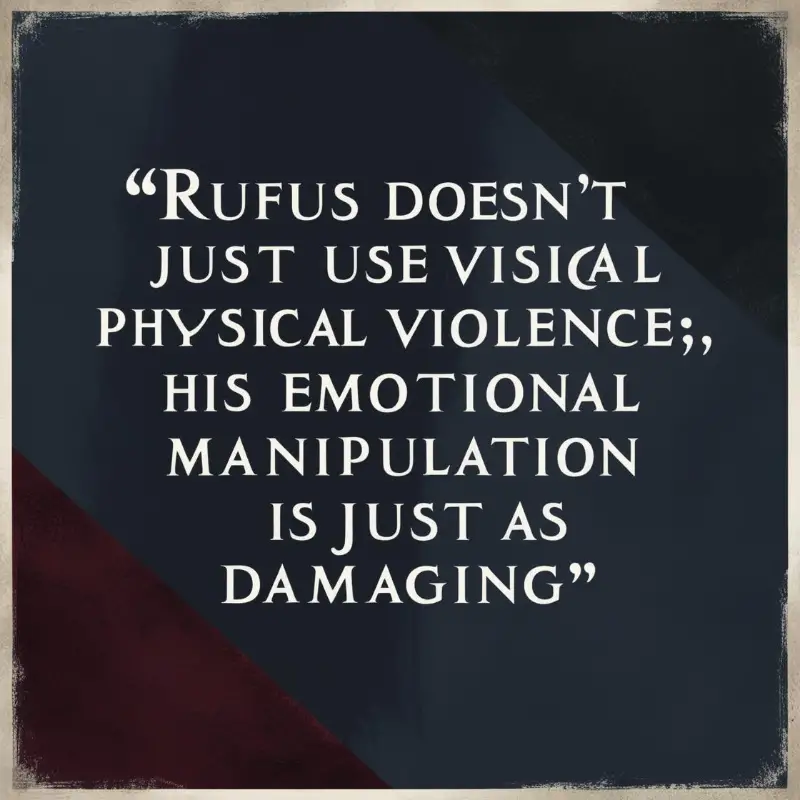
Rufus and His Abusive Behavior: Analyzing the Dynamics of Power
- “Rufus Weylin’s actions toward Alice were manipulative and cruel, seeking to control her every move.”
This quote highlights the cruel behavior Rufus exhibits towards Alice, a reflection of the Rufus Weylin abuse analysis. His actions reveal the toxic dynamics that permeate his relationships. - “Rufus’s temper was unpredictable, and his abuse escalated when Dana tried to assert herself.”
This emphasizes the power imbalance present in Rufus’s relationship with Dana, particularly when he feels threatened. His violent nature is a key theme in kindred violence quotes. - “The way Rufus uses violence to gain control over others shows the darker side of power dynamics in Kindred.”
Rufus’s use of violence is a reflection of the theme of power and control, which is central to Power and control in Kindred. - “Rufus doesn’t just use physical violence; his emotional manipulation is just as damaging.”
This quote reveals that Rufus’s abuse is not limited to physical acts but extends to emotional manipulation, a central element in Rufus and Alice relationship dynamics. - “Every time Rufus abuses Dana, it becomes clearer that he sees her as property rather than a partner.”
Rufus’s objectification of Dana is part of the larger Rufus Weylin abuse analysis, where power is exerted through both physical violence and psychological domination. - “Dana’s repeated return to Rufus’s time shows the complicated nature of survival, where abuse is intertwined with survival.”
The complexities of survival in the context of abuse are explored through Dana’s relationship with Rufus, which ties into Kindred themes of abuse and survival. - “Rufus’s use of threats and punishment creates an environment where Dana has little choice but to comply.”
Rufus’s control over Dana is built on intimidation, revealing the psychological violence that is often present in abusive relationships, as explored in Kindred quotes about Dana and Rufus. - “In Kindred, the constant cycle of violence reflects the systemic abuse that existed during slavery.”
The abusive relationship between Dana and Rufus is a direct commentary on Abuse and enslavement in literature, especially in the context of the historical realities of slavery. - “Rufus’s need to assert dominance over Alice is rooted in the same mindset that fueled the institution of slavery.”
Rufus’s relationship with Alice reflects the broader themes of power and control, which are inherent in Rufus Weylin abuse analysis and highlight the tragic consequences of enslavement. - “The brutality Rufus exhibits is not an anomaly but a symptom of a culture that normalizes violence and abuse.”
This reflects the institutionalized violence Rufus perpetuates, which is a key aspect of kindred violence quotes and Abuse and enslavement in literature. - “Dana’s sense of powerlessness under Rufus’s rule mirrors the historical context of women and slaves under oppressive systems.”
This speaks to the systemic abuse that is a significant theme in Kindred themes of abuse and survival. - “Rufus’s abusive behavior is a reflection of his deep-seated insecurities and his desperate need to control his environment.”
The psychological motivations behind Rufus’s actions are explored in Rufus Weylin abuse analysis, highlighting how abuse stems from insecurity and the desire for control. - “Dana’s refusal to comply with Rufus’s demands is met with escalating violence, underscoring his control tactics.”
The escalation of abuse in response to Dana’s resistance showcases the Power and control in Kindred as Rufus’s need to dominate becomes more evident. - “Despite his actions, Rufus still expects loyalty from Dana, demonstrating the distorted love he believes in.”
Rufus’s expectation of loyalty despite his abuse reflects the psychological manipulation often present in abusive relationships, explored in Rufus and Alice relationship dynamics. - “Rufus’s desire to ‘possess’ Dana parallels the violent nature of slavery and the ownership that was ingrained in that system.”
The connection between Rufus’s abusive behavior and the historical practice of slavery is a central theme in Abuse and enslavement in literature.
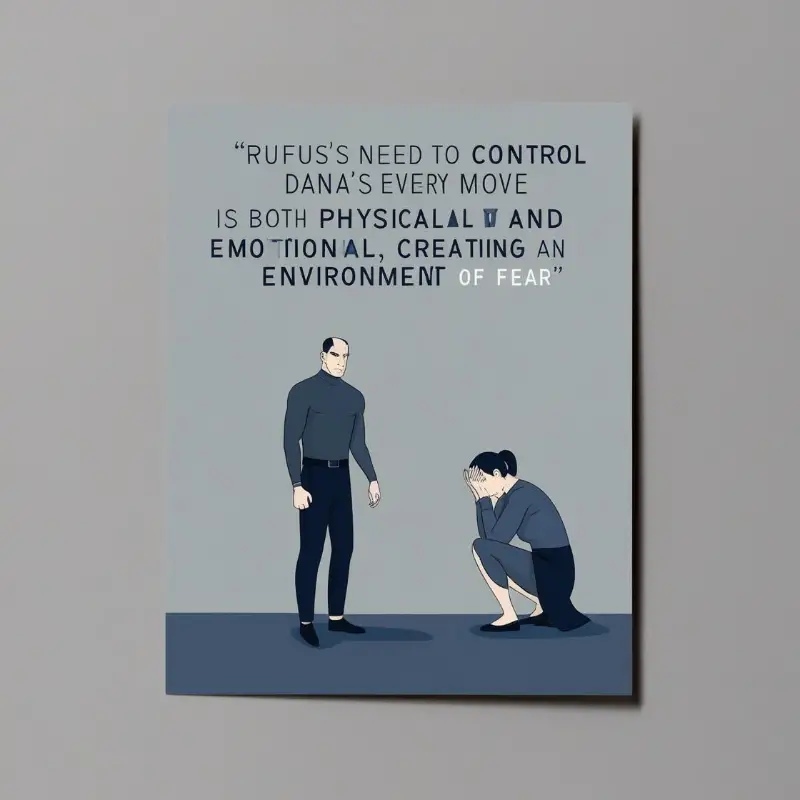
The Power Struggle in Kindred: A Deep Dive into Rufus’s Abuse
- “Rufus’s treatment of Dana goes beyond physical violence; it’s about maintaining dominance at all costs.”
Rufus’s abuse of Dana is about asserting control, which fits within the analysis of Rufus Weylin abuse analysis. - “Rufus sees himself as a ‘master’ of Dana, not just in the literal sense, but emotionally and psychologically as well.”
This reflects the psychological abuse that is a consistent theme in Rufus and Alice relationship dynamics, where emotional manipulation is used to control others. - “The violence Dana experiences in Rufus’s world is a direct consequence of the power imbalance he maintains.”
The power dynamic is key to understanding the Power and control in Kindred as Rufus’s violence is directly tied to his need to keep Dana submissive. - “Dana’s repeated visits to Rufus’s time show how survivors of violence can become entangled in cycles of abuse.”
This highlights the cyclical nature of abuse, as Dana is forced to interact with Rufus despite the harm he causes, a core concept in Kindred themes of abuse and survival. - “Rufus’s need to control Dana’s every move is both physical and emotional, creating an environment of fear.”
Rufus’s abuse manifests in multiple forms, including emotional manipulation and physical violence, underscoring the kindred violence quotes present throughout the narrative. - “Despite all the harm Rufus causes, there are moments where Dana questions her ability to leave, showcasing the grip of abuse.”
This speaks to the complex psychology behind abusive relationships, explored in Kindred quotes about Dana and Rufus. - “Rufus’s need for control over Alice is evident in his attempts to mold her into what he desires, regardless of her own will.”
This quote reflects the dynamics of control within Rufus and Alice relationship dynamics, where Alice’s autonomy is continually denied. - “The escalation of violence in Kindred illustrates how power is used as a tool of control in abusive relationships.”
Rufus’s behavior is a textbook example of how violence is often a means to enforce control, a key theme in Power and control in Kindred. - “Dana’s attempts to change the future are stifled by Rufus’s violent tendencies, which serve as a barrier to her own growth.”
Rufus’s oppressive behavior is an obstacle to Dana’s autonomy, central to Kindred themes of abuse and survival. - “Rufus’s violent tendencies are not just personal flaws but are products of a larger, systemic culture of abuse.”
This highlights how Rufus’s behavior is shaped by broader societal forces, which is a theme in Abuse and enslavement in literature. - “Every time Dana tries to assert control, Rufus reacts with violence, reaffirming his belief that power is maintained through fear.”
Rufus’s abuse is rooted in fear-based control, a theme reflected in Power and control in Kindred. - “Rufus believes that violence is a necessary tool to ensure compliance, showing his complete disregard for Dana’s autonomy.”
This quote shows how Rufus’s violence is both premeditated and strategic, reflecting the core themes in Rufus Weylin abuse analysis. - “Rufus’s controlling nature eventually drives Alice to despair, highlighting the long-term psychological effects of abuse.”
The mental toll of Rufus’s abuse on Alice is evident, demonstrating how abuse can break down individuals, explored in Rufus and Alice relationship dynamics. - “In Kindred, violence is not just physical; it’s also a form of ownership and control, especially in Rufus’s relationship with Dana.”
This underscores the central role that power and violence play in Rufus’s treatment of Dana, a key element in Kindred violence quotes. - “Rufus’s abuse is not an isolated event, but a manifestation of a deeper, societal issue of power and control over others.”
This quote connects Rufus’s behavior to broader themes of societal structures that enable violence and control, a key discussion in Abuse and enslavement in literature.
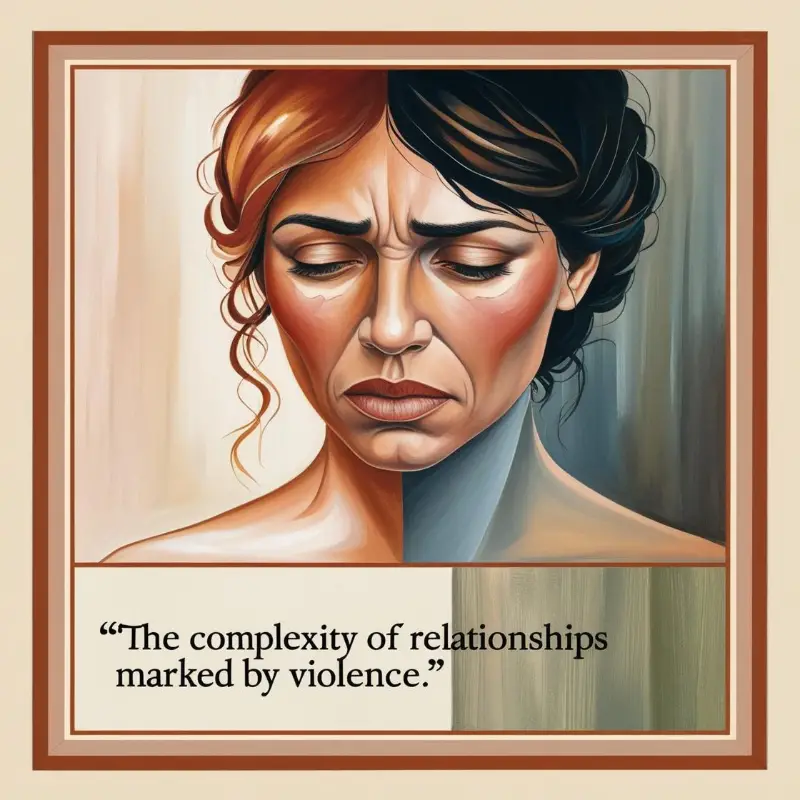
Exploring the Cycle of Abuse in Kindred: Rufus and Dana’s Complex Relationship
- “Rufus’s behavior toward Dana is a constant reminder of the power dynamics that control the relationship between them.”
This quote highlights the abusive nature of Rufus’s relationship with Dana, as he constantly exerts control, making her a subject of his power and manipulation. This dynamic ties into the theme of Rufus Weylin abuse analysis. - “Rufus’s emotional manipulation of Dana is just as damaging as his physical violence, showing the full extent of his control.”
Rufus’s abuse goes beyond physical violence, encompassing emotional and psychological manipulation, which plays a significant role in Rufus and Alice relationship dynamics. - “Dana’s struggles to reconcile her love for Rufus with his abuse show the complexity of relationships marked by violence.”
This quote reflects the complicated emotional entanglement that Dana faces due to Rufus’s manipulation and violence, a key component in Kindred themes of abuse and survival. - “Despite his abusive actions, Rufus often justifies his behavior by claiming to act out of love, distorting the nature of true affection.”
Rufus’s distorted view of love in the face of his abusive behavior reflects the psychological impact of kindred violence quotes, where abuse is masked as care. - “Each time Dana is sent back to Rufus’s time, she faces escalating violence, reinforcing the toxic nature of their relationship.”
The repeated cycles of abuse that Dana faces underscore the survival aspect of Kindred themes of abuse and survival, where Dana’s journey is shaped by this abuse. - “Rufus’s violent outbursts are fueled by his need for power and control, often making Dana feel trapped and powerless.”
This quote reflects the power-driven nature of Rufus’s behavior, which is central to Power and control in Kindred, demonstrating the domination he exerts over Dana. - “Rufus’s treatment of Dana reveals a disturbing pattern of control and ownership, typical of abusive relationships.”
The ownership Rufus feels over Dana mirrors the systemic violence and control present in abusive dynamics, explored through Rufus Weylin abuse analysis. - “Rufus’s cruelty towards Dana is justified by his belief in his entitlement to control her actions and decisions.”
Rufus’s sense of entitlement is a central aspect of his abuse, reflecting the power dynamics inherent in Rufus and Alice relationship dynamics. - “The abuse that Dana faces in Rufus’s world is a stark reminder of the systemic violence that enslavement and oppression breed.”
This connects Rufus’s personal abuse of Dana to the broader context of Abuse and enslavement in literature, where violence is institutionalized. - “Rufus’s need for control over Dana reflects the themes of manipulation and coercion seen in many abusive relationships.”
The psychological manipulation Rufus uses to control Dana illustrates the pervasive influence of Kindred violence quotes and abuse dynamics in the narrative. - “Rufus’s controlling behavior is a direct reflection of the historical power imbalances present during the time of slavery.”
Rufus’s actions are a commentary on the broader social context of Power and control in Kindred, where violence is intertwined with the culture of enslavement. - “Dana’s survival is contingent on her ability to navigate Rufus’s violent outbursts, which continually put her at risk.”
This quote explores the survival aspect of Dana’s journey, emphasizing the constant danger she faces in her encounters with Rufus, central to Kindred themes of abuse and survival. - “Rufus’s manipulation of Dana’s emotions and sense of responsibility shows the psychological effects of abuse.”
Rufus’s psychological manipulation, including guilt and responsibility, is a powerful tool in his control over Dana, a theme explored in Rufus Weylin abuse analysis. - “The cycles of violence in Kindred are unrelenting, showing how survivors of abuse often feel trapped in their circumstances.”
This quote reflects the feeling of entrapment that Dana experiences in her repeated encounters with Rufus, central to the theme of Kindred themes of abuse and survival. - “Rufus’s justification for his abuse shows how power dynamics are used to rationalize violence and control in abusive relationships.”
Rufus’s rationalization of his behavior is a key element in Power and control in Kindred, where the abuser justifies their actions through distorted perceptions of power.
The Long-lasting Impact of Rufus’s Abuse: A Historical and Psychological Examination
- “Rufus’s abuse of Dana reflects the historical patterns of power, control, and violence inherent in slavery.”
The dynamics of Rufus’s relationship with Dana serve as a microcosm of the broader historical patterns of control and violence during slavery, reflecting the deeper Abuse and enslavement in literature. - “Rufus’s use of emotional and physical violence to control Dana and Alice illustrates the destructive nature of power in relationships.”
The emotional and physical abuse Rufus directs toward both women highlights the destructive consequences of Rufus and Alice relationship dynamics. - “Dana’s forced compliance with Rufus’s demands is a clear illustration of the psychological manipulation that often accompanies abuse.”
The psychological manipulation Dana experiences is central to Kindred violence quotes, showing how abuse operates on multiple levels of control. - “Rufus’s actions demonstrate the ways in which abuse and power are normalized in systems of oppression.”
Rufus’s actions are part of the larger system of oppression that is a theme in Abuse and enslavement in literature, where power and control are normalized through violence. - “Dana’s repeated returns to Rufus’s time show the complex nature of surviving abuse and how it alters one’s sense of agency.”
The cyclical nature of Dana’s interactions with Rufus underscores the theme of survival in the face of ongoing abuse, a key element of Kindred themes of abuse and survival. - “Rufus’s belief in his superiority and entitlement to control women underscores the psychological and cultural roots of his abuse.”
Rufus’s worldview is shaped by his belief in his superiority and entitlement, which is a fundamental part of Rufus Weylin abuse analysis. - “The complex relationship between Dana and Rufus highlights how abuse can alter the dynamics of survival and power in difficult circumstances.”
This quote explores the complexity of surviving abuse while dealing with an abuser who manipulates power dynamics, central to Kindred themes of abuse and survival. - “Rufus’s repeated violence is a strategy to keep Dana in line, reflecting how abusers create cycles of fear and submission.”
Rufus’s violence is part of a calculated strategy to keep Dana under his control, which mirrors the themes of Power and control in Kindred. - “Despite Rufus’s abuse, Dana’s feelings toward him are complicated, highlighting how abuse and affection can be intertwined.”
Dana’s emotional conflict with Rufus illustrates the psychological complexity of abusive relationships, explored in Rufus and Alice relationship dynamics. - “Rufus’s treatment of Dana highlights the theme of possession and ownership, which is prevalent in both slavery and abusive relationships.”
The way Rufus treats Dana as an object to be controlled fits into the larger theme of Abuse and enslavement in literature, emphasizing the power of ownership in abusive systems. - “Rufus’s abuse extends beyond physical harm; it is also a form of social and emotional control that limits Dana’s freedom.”
This shows how Rufus’s abuse is both physical and psychological, a key aspect of Rufus Weylin abuse analysis. - “The repeated abuse Dana faces from Rufus is a constant reminder of the intersection between personal trauma and historical injustice.”
Dana’s abuse serves as a powerful metaphor for the intersection of personal trauma with the larger context of slavery and oppression, explored in Abuse and enslavement in literature. - “Rufus’s cruelty is a reflection of the abusive nature of power structures during the time of slavery.”
Rufus’s behavior is shaped by the oppressive power structures of his time, a central theme in Power and control in Kindred. - “Rufus’s abuse of Dana and Alice serves as a powerful commentary on the cycle of violence that perpetuates systems of oppression.”
This quote highlights how Rufus’s abuse is not just personal but a reflection of the broader cycle of violence inherent in systems of oppression, explored in Kindred themes of abuse and survival.
Rufus Weylin’s Abuse as a Reflection of Historical Power Structures
- “Rufus’s violence is not just personal; it reflects the broader power dynamics that were present in society during slavery.”
Rufus’s abuse of Dana serves as a mirror to the oppressive social structure of the time. It is a vivid example of how Abuse and enslavement in literature are interwoven with power dynamics. - “The power imbalance between Rufus and Dana mirrors the historical systems of slavery, where control and violence were normalized.”
Rufus’s actions in Kindred are an extension of the systemic violence that defined slavery, showing how Rufus Weylin abuse analysis often ties back to this broader cultural context. - “Through Rufus, Butler highlights how deeply ingrained power dynamics lead to the perpetuation of abuse and control in relationships.”
Rufus’s character is an embodiment of the institutionalized power structures that foster abuse, aligning with themes of Power and control in Kindred. - “Rufus’s belief in his inherent superiority as a white male slaveowner makes his abuse seem justifiable to him, reinforcing the cycle of violence.”
Rufus’s warped self-perception is a critical part of Rufus Weylin abuse analysis, where his violence is justified by societal norms and his own sense of entitlement. - “Dana’s encounters with Rufus illustrate the way power and control were used to maintain the status quo during slavery.”
The way Rufus controls Dana reflects how power dynamics in relationships were often used to perpetuate inequality, fitting into Abuse and enslavement in literature. - “Rufus’s behavior is a direct product of the hierarchical society he grew up in, where abuse was a tool for maintaining power.”
The abusive relationship between Dana and Rufus is rooted in the systemic violence present during slavery, fitting into Rufus Weylin abuse analysis. - “The cycles of abuse that Dana faces serve as a commentary on how individuals internalize and perpetuate societal power structures.”
Rufus’s abuse is a reflection of how societal violence is passed down through generations, reinforcing the theme of Kindred themes of abuse and survival. - “Rufus’s desire to possess Dana and control her every move highlights the objectification that was common in slavery.”
Rufus’s treatment of Dana is a reflection of the dehumanization that occurred in slavery, a key aspect of Kindred themes of abuse and survival. - “Dana’s survival depends on her ability to navigate the violent and oppressive world created by Rufus’s actions.”
Dana’s constant return to a world filled with violence highlights her struggle for survival in a system built on abuse, part of Abuse and enslavement in literature. - “The normalization of abuse in Rufus’s world serves as a powerful critique of how institutionalized violence destroys human connections.”
Rufus’s behavior is normalized in the society he inhabits, reflecting how institutional violence permeates everyday life, a key theme in Rufus Weylin abuse analysis. - “Rufus’s violence toward Dana shows the ways in which oppression distorts relationships and leads to emotional and physical trauma.”
This quote touches on how oppressive systems like slavery have a lasting impact on relationships, seen through Kindred violence quotes. - “Dana’s emotional entanglement with Rufus reveals how abuse can complicate feelings of attachment and love.”
The emotional complexity between Dana and Rufus emphasizes how power and abuse often coexist in abusive relationships, aligning with Rufus and Alice relationship dynamics. - “Rufus’s repeated abuse of Dana is indicative of the lasting trauma caused by slavery and its violent power structures.”
The continued abuse Dana faces shows how slavery’s power structures continue to inflict harm, a part of Kindred themes of abuse and survival. - “The abuse in Kindred is not just about physical violence but also about controlling another person’s will and agency.”
Rufus’s manipulation and coercion of Dana align with the broader themes of Power and control in Kindred, showing how control was used to maintain dominance. - “Rufus’s cruelty is a manifestation of the entitlement that existed in societies built on slavery and racial superiority.”
Rufus’s abuse is a direct product of the cultural entitlement seen in historical power structures, reinforcing the theme of Power and control in Kindred.
Dana’s Survival Amidst Abuse: Navigating the Cycles of Control
- “Survival for Dana means enduring the cycles of abuse that Rufus subjects her to, where every interaction seems to result in more manipulation.”
Dana’s survival is a testament to her resilience, but it’s also about managing and surviving the manipulative cycles of control enforced by Rufus, a part of Kindred themes of abuse and survival. - “Each time Dana returns to Rufus’s time, she is forced to re-engage with his abusive behavior, complicating her ability to break free.”
Dana’s repeated returns to an abusive environment highlight the entrapment survivors feel, central to Kindred themes of abuse and survival. - “Rufus’s manipulation of Dana’s emotional state is a critical part of his control, trapping her in a cycle of guilt and fear.”
Rufus’s emotional manipulation of Dana is a tool for maintaining his power, as seen in Rufus Weylin abuse analysis. - “Dana struggles with the moral and emotional conflicts that arise from her relationship with Rufus, who alternates between violence and affection.”
The emotional conflict Dana faces underscores the complexity of surviving an abusive relationship, as explored in Rufus and Alice relationship dynamics. - “Dana’s physical survival is tied to her ability to comply with Rufus’s demands, making her feel trapped in a cycle of abuse.”
Rufus’s control over Dana’s life is deeply physical and psychological, reflecting the survival tactics needed in the face of abuse, fitting into Kindred themes of abuse and survival. - “Rufus’s treatment of Dana reflects the dehumanizing effect that abuse has on both the victim and the perpetrator.”
Rufus’s behavior illustrates the damaging effects of abuse on both the victim and the abuser, a theme explored in Rufus Weylin abuse analysis. - “The ongoing abuse that Dana faces at Rufus’s hands is a reminder of how trauma is passed down and perpetuated through generations.”
Dana’s trauma is reflective of the generational abuse seen throughout the history of slavery, aligning with the broader theme of Abuse and enslavement in literature. - “Rufus’s manipulation of Dana’s sense of responsibility and love is a powerful tool for maintaining his abusive control.”
Rufus’s ability to manipulate Dana emotionally keeps her trapped in the cycle of abuse, a key part of Rufus Weylin abuse analysis. - “Dana’s struggle to maintain her autonomy in the face of Rufus’s abuse is a testament to the strength of survivors.”
Dana’s fight for autonomy in the face of oppression demonstrates the strength required to survive abuse, central to Kindred themes of abuse and survival. - “The repeated abuse Dana faces shows how survivors often need to fight for their sense of self in the midst of constant oppression.”
The psychological toll of Rufus’s abuse on Dana is central to her journey of survival, reflecting the broader theme of Kindred themes of abuse and survival. - “Despite the abuse, Dana’s emotional connection to Rufus complicates her ability to escape the toxic relationship.”
The emotional conflict Dana faces emphasizes the complexity of relationships marked by abuse, explored in Rufus and Alice relationship dynamics. - “Dana’s return to Rufus’s world each time highlights the cyclical nature of trauma and the difficulty of escaping abusive environments.”
The cyclical nature of Dana’s encounters with Rufus shows how trauma can be difficult to escape, a key aspect of Kindred themes of abuse and survival. - “Rufus’s constant manipulation of Dana demonstrates how abusers use love and affection to control their victims.”
Rufus’s emotional manipulation, including using affection as a control tool, is a common tactic in abusive relationships, central to Kindred violence quotes. - “Dana’s survival against Rufus’s abuse is a reflection of the human capacity to resist and endure even the most oppressive circumstances.”
Dana’s endurance in the face of Rufus’s control and violence speaks to her resilience, aligning with Kindred themes of abuse and survival.
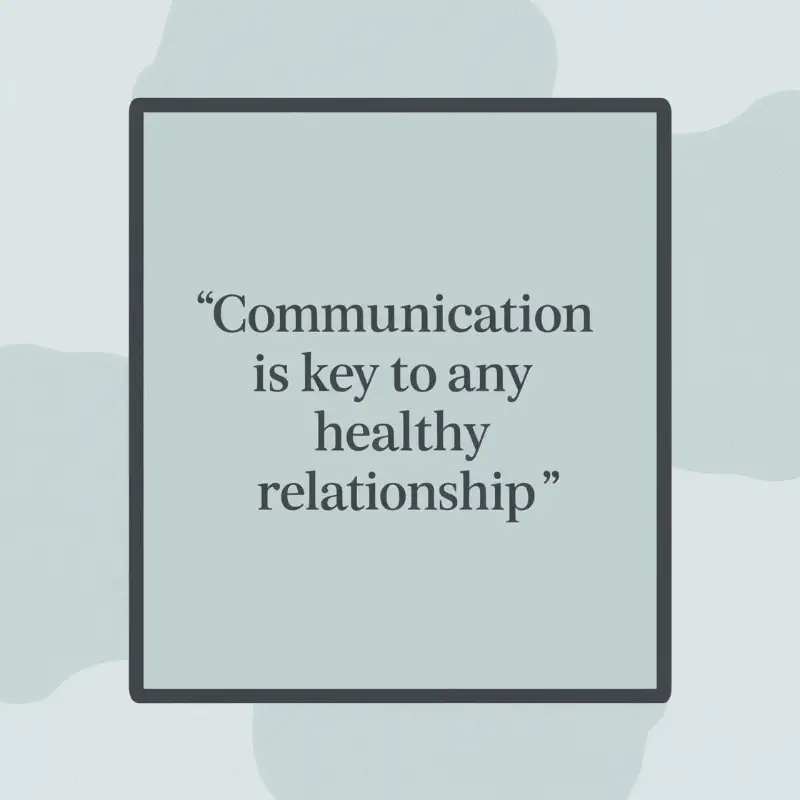
The Emotional Manipulation in Rufus and Dana’s Relationship
- “Rufus’s abuse is often psychological, using emotional manipulation to control Dana and make her feel responsible for his actions.”
Rufus’s emotional manipulation, a constant theme in Rufus Being Abusive Quotes, illustrates how abusers often use guilt to maintain power in relationships. - “Dana’s emotions become a battleground for Rufus, who switches between love and cruelty to keep her under control.”
Rufus’s use of emotional extremes is a powerful tool for maintaining dominance, a form of abuse seen in Rufus Being Abusive Quotes throughout their interactions. - “Rufus’s controlling behavior forces Dana into situations where she must choose between her own safety and his affection.”
This dynamic shows how abusers like Rufus use affection as a weapon, an example found in Rufus Being Abusive Quotes, to manipulate and control their victims. - “Dana’s internal struggle to understand why she still cares for Rufus, despite his cruelty, reflects the emotional confusion caused by abuse.”
Abusers often create emotional confusion, leaving victims questioning their own feelings, as demonstrated in Rufus Being Abusive Quotes, where Dana faces this internal battle. - “The emotional violence Dana suffers at Rufus’s hands has long-lasting effects, as she finds it difficult to break free from his influence.”
Rufus’s abuse is not just physical but psychological, leaving deep scars that make Dana’s escape from his control incredibly difficult, a recurring theme in Rufus Being Abusive Quotes. - “Rufus manipulates Dana’s sense of duty to him, making her feel responsible for his well-being and survival, a classic tactic of emotional abuse.”
This form of control is often used by abusers to keep their victims entangled in their toxic relationships, as seen in Rufus Being Abusive Quotes. - “Dana’s emotional dependence on Rufus creates a dangerous dynamic where she feels obligated to endure his abuse.”
The emotional grip that Rufus holds over Dana is part of what makes her feel trapped, a central theme explored in Rufus Being Abusive Quotes. - “Rufus’s volatile emotional state makes it hard for Dana to predict how he will treat her, increasing her sense of fear and uncertainty.”
This unpredictability is another tactic of emotional control, ensuring that Dana is constantly walking on eggshells, a key component of Rufus Being Abusive Quotes. - “Rufus’s cruel treatment of Dana is often masked as love, complicating Dana’s ability to recognize the abuse for what it is.”
The manipulation of love as a form of control is a hallmark of Rufus Being Abusive Quotes, where affection is used to justify abusive behavior. - “Dana is forced to navigate a complex emotional landscape, trying to differentiate between real affection and the power dynamics at play.”
This constant confusion is a result of the abuse Dana faces, a common tactic used by abusers, highlighted in Rufus Being Abusive Quotes. - “Despite the abuse, Dana often feels compelled to return to Rufus, showing the emotional hold he has on her.”
Dana’s emotional attachment to Rufus, despite his mistreatment, is an example of how abusers can make their victims feel bound to them, as seen in Rufus Being Abusive Quotes. - “Rufus’s behavior pushes Dana to question her own worth, a typical effect of prolonged emotional abuse.”
This self-doubt and questioning of worth are central to the psychological damage caused by abuse, a theme that runs through Rufus Being Abusive Quotes. - “Rufus’s use of love as a weapon makes Dana feel conflicted, unable to escape even though she knows his behavior is harmful.”
The manipulation of love to keep Dana emotionally trapped is a direct consequence of Rufus Being Abusive Quotes, where love and abuse become indistinguishable. - “Dana struggles to reconcile her feelings for Rufus with the undeniable cruelty he shows, reflecting the complicated nature of abusive relationships.”
This internal conflict is something many victims of abuse face, a theme explored in depth through Rufus Being Abusive Quotes. - “Dana’s emotional isolation grows as Rufus continues to control her, leaving her with fewer places to turn for support.”
The emotional isolation often caused by abusers, like Rufus, is a tactic designed to make the victim feel even more dependent on the abuser, as seen in Rufus Being Abusive Quotes.
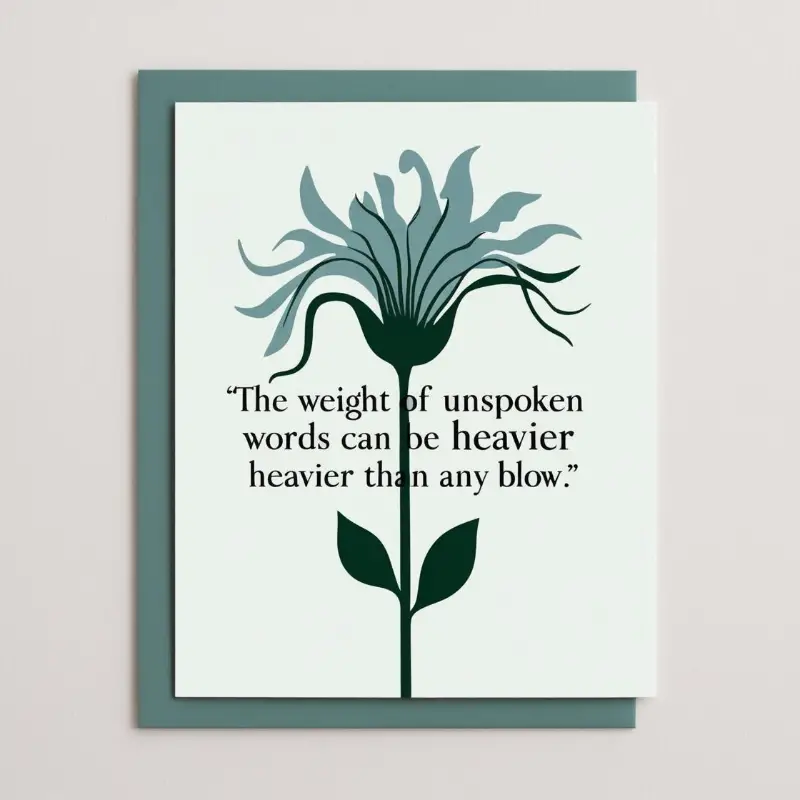
The Psychological Toll of Rufus’s Abuse on Dana
- “Rufus’s abuse is not limited to physical violence; it also affects Dana’s mental and emotional state, slowly breaking her down.”
Rufus’s psychological manipulation leaves deep scars, a central theme in Rufus Being Abusive Quotes, where the mental toll of his actions becomes apparent. - “Dana’s repeated encounters with Rufus in the past leave her with a lasting sense of fear and anxiety that shapes her every decision.”
The trauma caused by repeated abuse impacts Dana’s ability to function, as reflected in Rufus Being Abusive Quotes, which highlight the lasting mental effects. - “Rufus’s cruel words and actions continue to haunt Dana even when she’s no longer physically with him.”
This lingering effect of psychological abuse is common, where the victim continues to feel the impact of their abuser’s words, as seen in Rufus Being Abusive Quotes. - “Dana’s constant battle to protect herself from Rufus’s manipulation shows the immense emotional toll that abuse takes on its victims.”
The psychological cost of surviving abuse is portrayed throughout Rufus Being Abusive Quotes, where Dana constantly fights to retain her sense of self. - “Rufus’s violent tendencies leave Dana with a constant sense of dread, making it hard for her to trust others.”
The ongoing fear Dana experiences highlights the mental toll of living in an abusive environment, a theme central to Rufus Being Abusive Quotes. - “Rufus’s abuse makes Dana question her own sanity, as his manipulation warps her sense of reality.”
Abusers often gaslight their victims, making them doubt their own perceptions. This theme of mental manipulation is captured in Rufus Being Abusive Quotes. - “Dana’s coping mechanisms are shaped by Rufus’s abuse, leaving her with few emotional resources to deal with other challenges.”
The impact of Rufus’s abuse goes beyond physical violence, as Dana’s emotional resilience is tested repeatedly, as reflected in Rufus Being Abusive Quotes. - “Rufus’s control over Dana’s thoughts and actions leaves her feeling trapped, mentally and physically.”
The psychological imprisonment Dana experiences as a result of Rufus’s control highlights the long-term effects of abuse, a key theme in Rufus Being Abusive Quotes. - “Despite her strength, Dana is forced to confront her own vulnerabilities, exposed through Rufus’s manipulation and control.”
Rufus’s ability to exploit Dana’s weaknesses is central to his abusive tactics, emphasizing the psychological cost of living under constant threat, as seen in Rufus Being Abusive Quotes. - “Rufus’s repeated emotional and physical attacks chip away at Dana’s sense of self-worth, leading her to question her own value.”
The impact of repeated abuse on Dana’s self-esteem is captured in Rufus Being Abusive Quotes, where the psychological damage is evident. - “Dana’s experiences with Rufus demonstrate the long-term effects of psychological abuse, where the scars are invisible but deeply felt.”
The invisible scars left by Rufus’s abuse are central to Rufus Being Abusive Quotes, showing how mental manipulation can be as harmful as physical violence. - “Rufus’s abuse leaves Dana with an overwhelming sense of helplessness, making her feel powerless even in moments of strength.”
The powerlessness that Dana feels is a hallmark of abusive relationships, reflected in the continued toll Rufus’s actions take on her mental health, as seen in Rufus Being Abusive Quotes. - “The constant emotional abuse Dana faces chips away at her resilience, showing how sustained trauma can break even the strongest individuals.”
The theme of broken resilience is explored in Rufus Being Abusive Quotes, illustrating the mental fatigue caused by living with an abuser. - “Rufus’s emotional abuse has a lasting impact on Dana, leaving her struggling with feelings of guilt and shame.”
The emotional abuse inflicted by Rufus leads Dana to feel a sense of shame, which is a typical result of psychological manipulation, a key theme in Rufus Being Abusive Quotes.






